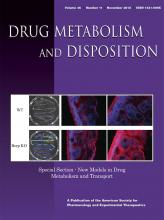Abstract
Colon microbiota-based drug metabolism has received little attention thus far in the process of drug development, whereas the role of gut microbiota in clinical safety and efficacy of drugs has become more clear. Many of these studies have been performed using animal studies, but the translational value of these data with respect to drug pharmacokinetics, efficacy, and safety is largely unknown. To investigate human colon microbiota-mediated drug metabolism, we applied a recently developed ex vivo fermentation screening platform, in which human colonic microbiota conditions are simulated. A set of 12 drugs (omeprazole, simvastatin, metronidazole, risperidone, sulfinpyrazone, sulindac, levodopa, dapsone, nizatidine, sulfasalazine, zonisamide, and acetaminophen) was incubated with human colon microbiota under strictly anaerobic conditions, and samples were analyzed using high-performance liquid chromatograph–UV–high-resolution mass spectrometry analysis. The human microbiota in the fermentation assay consisted of bacterial genera regularly encountered in human colon and fecal samples and could be reproducibly cultured in independent experiments over time. In addition, fully anaerobic culture conditions could be maintained for 24 hours of incubation. Five out of the 12 included drugs (sulfasalazine, sulfinpyrazone, sulindac, nizatidine, and risperidone) showed microbiota-based biotransformation after 24 hours of incubation in the ex vivo fermentation assay. We demonstrated that drug metabolites formed by microbial metabolism can be detected in a qualitative manner and that the data are in accordance with those reported earlier for in vivo metabolism. In conclusion, we present a research tool to investigate human colon microbiota-based drug metabolism that may be applied to enable translatability of microbiota-based drug metabolism.
Footnotes
- Received February 22, 2018.
- Accepted August 1, 2018.
↵1 E.v.d.S. and F.H.J.S. contributed equally to the manuscript.
The work described was partly funded by the Dutch Government, Ministry of Economic Affairs.
↵
 This article has supplemental material available at dmd.aspetjournals.org.
This article has supplemental material available at dmd.aspetjournals.org.
- Copyright © 2018 by The American Society for Pharmacology and Experimental Therapeutics
DMD articles become freely available 12 months after publication, and remain freely available for 5 years.Non-open access articles that fall outside this five year window are available only to institutional subscribers and current ASPET members, or through the article purchase feature at the bottom of the page.
|







